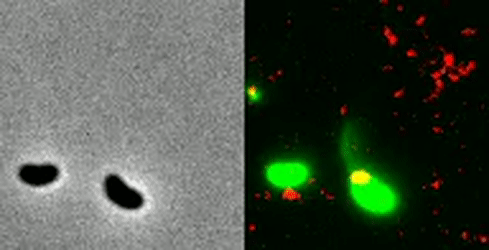Watch Strange, Glowing Bacteria Harpoon and Swallow DNA to Evolve

In an astonishing new video, a bacterium reaches out into space, snatches a piece of DNA and stuffs that DNA into its own body. Its appendage, much longer than its own body, wanders and bends a little but seems to move with intention toward its target. And the whole act is part of the microbe's effort to evolve.
The video is the first direct observation of bacteria using appendages called pili to "harpoon" loose DNA and incorporate it into the bacteria's own genetic structures. It shows how the single-celled organisms pull off a neat trick called "horizontal gene transfer" that lets them adapt quickly to new environments. This would be a bit like if a person who's allergic to pollen needed only to reach out, snatch some loose flesh from a nonallergic friend and swallow it to get through spring without sneezing. [5 Ways Gut Bacteria Affect Your Health]
Researchers already knew that bacteria needed their pili to pull off horizontal gene transfer, but they'd never seen the maneuver in action, in part because the pili are too tiny to easily observe through a microscope. A single pilus, according to the videographers, is less than one-ten-thousandth the width of a human hair. And the hole the bacteria use to haul the loose DNA into their own single-celled "bodies" is "almost the exact width of a DNA helix bent in half," the researchers said in a statement.
So, to record the video, the researchers dyed the pili of Vibrio cholerae, the bacterium responsible for cholera, with fluorescent dye. The dye also covered the bacteria and the loose DNA. Then, the researchers stuck the bacteria and stray DNA under a regular microscope and waited to see what the now-glowing organism would do.
The researchers said they hope the findings, which were published June 11 in the journal Nature Microbiology, might be helpful for research into antibiotic-resistant bacteria.
Originally published on Live Science.
Sign up for the Live Science daily newsletter now
Get the world’s most fascinating discoveries delivered straight to your inbox.











